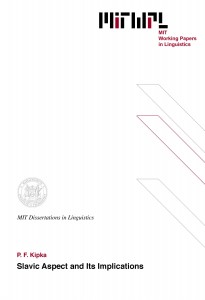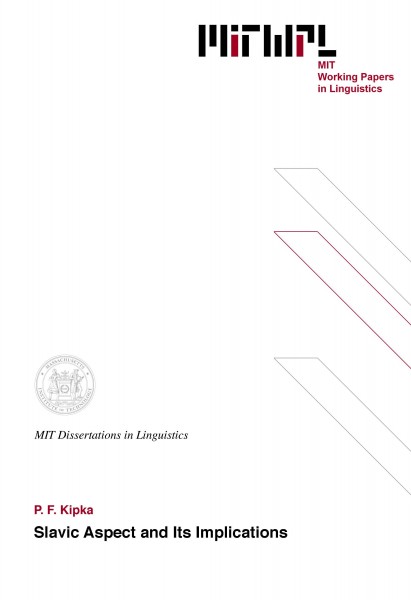Slavic Aspect and Its Implications
P. F. Kipka, 1990
The goal of this thesis is to explore a new theory of verbal aspect. The theory is motivated primarily by a consideration of morphological and syntactico-semantic data from Slavic, but as a module of Universal Grammar it can be shown to be of much more general applicability. Thus Slavic aspect is contrasted with what can be found in a variety of other languages. The proposed system of representation is derivational in character: Final aspectual structures are built up by a small number of operations from lexical representations. The theory posits only two aspectual primitives (the point and the box, yielding perfectivity and imperfectivity in Slavic in a direct fashion).
Chapter One begins with an overview of much of the relevant data from the Slavic language Polish. Morphological and syntactico-semantic reflexes of aspect are identified and correlated. This leads directly to a formulation of the theory. The working of the latter are demonstrated with respect to Polish verbs of motion. Its applicability to other languages (including English) is also discussed; one of the key factors contributing to the language differences is different means of lexical underspecification of aspectual structures.
Chapter Two examines further data from Slavic. It is shown how double-aspect phenomena, inherent perfectivity, and habituals can be construed as providing support for a theory of the type envisaged here. The proposed theory (its primitives, operations, and conditions) is summarised in this chapter.
Chapter Three is an exploration of the connection between aspect and prepositional notions. Core prepositions (or their equivalents) are taken to be interaction-denoting categories, a view that is contrasted with locationist hypotheses. Some aspectual consequences of this view are developed.
Finally, Chapter Four continues the study of extra-Slavic and prima facie extra-aspectual implications of the theory here proposed. The dative alternation in English is examined, as are the English locative alternation, Georgian medial verbs, and restrictions on English "re-" prefixation. Light is shed on these phenomena, which at the same time provide empirical support for such theoretical devices as aspectual zerohood, box-layering, and lexical underspecification.
Thesis Supervisor: Kenneth Hale
Title; Ferrari P. Ward Professor of Modern Languages and Linguistics
Table of Contents
Introduction 8
Chapter 1 A Theory of Aspect 13
1.1 The aspectual morphemes of Polish 14
1.2 On multi-prefixation 31
1.3 Syntax and semantics of aspect 37
1.4 Verbs of motion 46
1.5 The theory 53
1.6 Excursus on prefix interpretation 62
1.7 Aspect and tense 73
1.8 Remarks on English and other languages 84
Chapter 2 Further Slavic Issues 99
2.1 The double aspect phenomenon 100
2.2 Inherent perfectivity 119
2.3 The rules of the game 138
2.4 Further justification 159
2.5 Contra an alternative 165
2.6 Summary 171
Chapter 3 Prepositional Notions and Aspect 172
3.1 Some core prepositions 175
3.2 Connections with aspect 184
3.3 More on location 189
3.4 Extensions 201
3.5 Aspect revisited 208
Chapter 4 Applications and Implications 220
4.1 The dative alternation 220
4.2 A note on the locative alternation 259
4.3 Georgian 267
4.4 Re re 286
Concluding Thoughts 295

